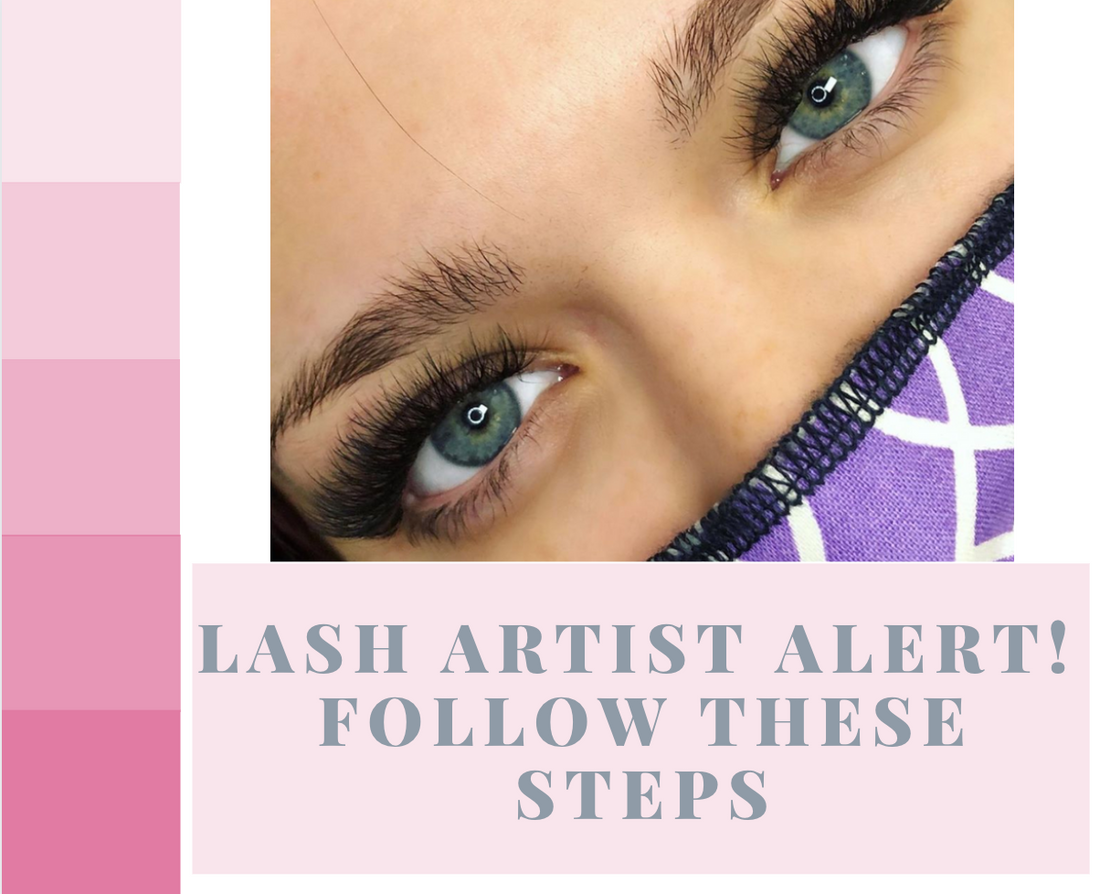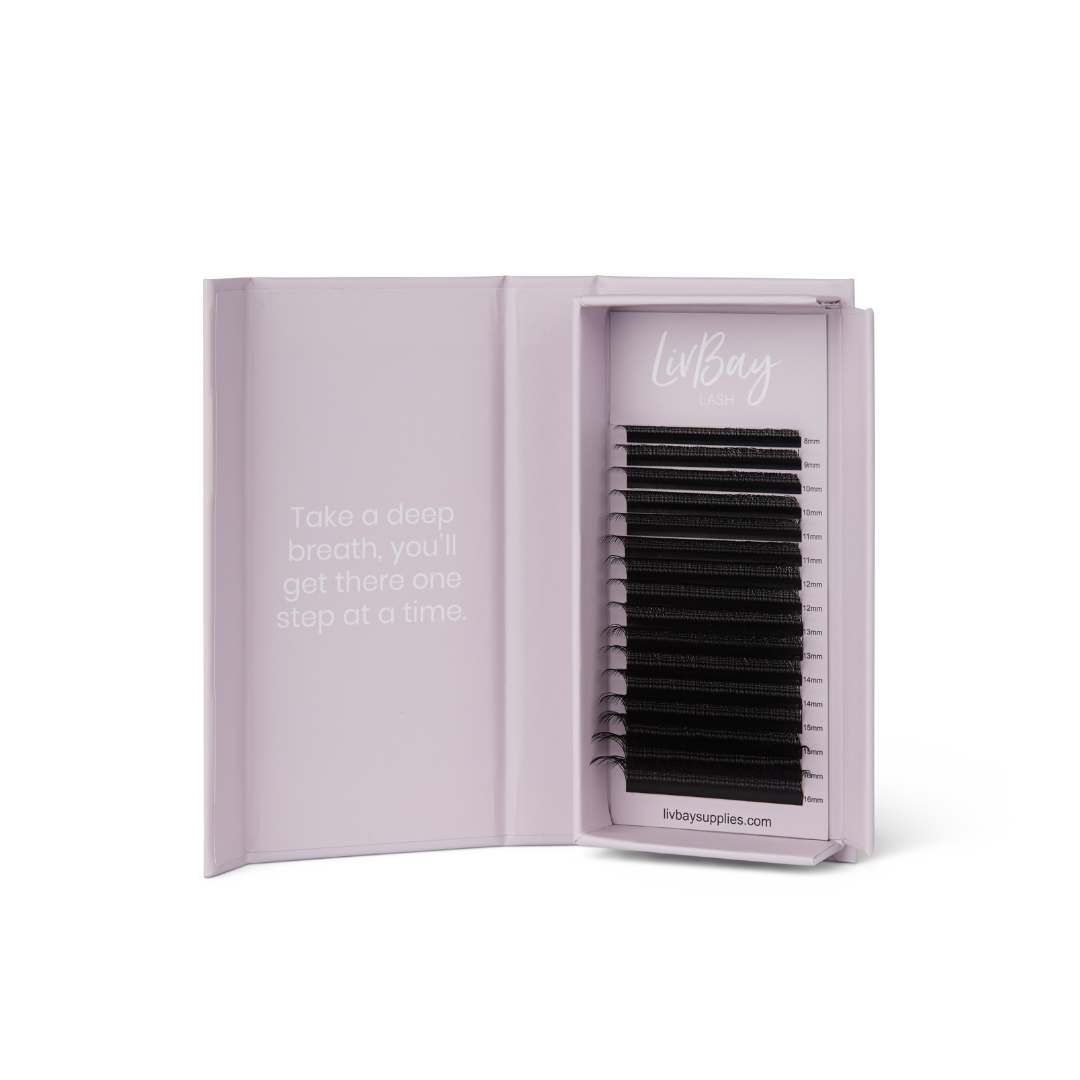
Lash Artist Alert! Clients Allergic To Eyelash Glue Should Always Follow These Steps
Share
Getting a lash extension service isn’t always rainbows and butterflies as one might think. Some complications may arise in the middle of lashing so along with mastering how to create a bomb looking lash set, every lash artist should learn how to deal with emergencies.
In this article, LivBay Lash tells you about lash extension allergies. We break down all the details you need to know when you have a client who is allergic to eyelash glue. Is there a way to turn things around when your client’s having an allergic reaction? Is there a hypoallergenic eyelash extension glue available? Well, there’s only one way to know so stay with us.
Why Are Some People Allergic to Eyelash Glue?
As you probably know by now, eyelash adhesives are made of quite a lot of chemicals that produce strong fumes. Lash extensions stick for several weeks without coming off so you gotta expect that there are some powerful substances included in the glue. With that in mind, it is quite natural that some people may be allergic to one or more of these chemicals.
Note that, not all lash glue complications are classified as allergies. Some of the clients are just sensitive and their eyes may feel a bit itchy and uncomfortable that can be dealt with by some simple remedies. As for others, lash glue causes full-on allergic reactions.
What Are Possible Allergens In Lash Adhesives?
Which of the chemicals triggers allergies? Well, you can never know that for sure, however, there are 3 substances that are the most likely to act as allergens:
1. LatexLatex allergies are quite common especially in people who have frequent contact with it (for example, health care workers). The condition may develop over time so when your client arrives, they might have no idea that they have a latex allergy. The good thing is that latex is not an irreplaceable ingredient of lash glue so you can purchase a latex-free adhesive as more of a safer option.

If you decide to switch to latex-free lash glue, note that it is much likely that your clients’ lash extensions will last about a week less. Apart from that, latex-free adhesives are a piece of cake to work with. There is a huge variety of options you can choose from that matches your lashing speed.
2. Carbon Black
Some of the clients may be allergic to lash glue because of the pigment that makes it black. This substance is called carbon black. It is added to the adhesive to give it black color so that it blends into lash extensions seamlessly. It is widely used in various fields including clothing, plastic production, and paints.
Even though using black adhesive is super convenient for lash extensions, some of your clients may be allergic to eyelash glue because of carbon black. So you need to have a back-up option. The best option in such cases is clear glue that works great for sensitive clients. However, it has relatively slower drying time (up to 2-2.5 seconds) so it will slow down your lashing process. Another disadvantage of using clear glue in lash extensions is low retention (about 5 weeks). So when you use this adhesive, make sure you inform your client about it to manage their expectations.

3. Cyanoacrylate
Cyanoacrylate is the main ingredient of lash adhesive. To make it more clear, it is the chemical that makes strong retention possible. Cyanoacrylate is used in numerous fast-drying adhesives including superglue, bandaids, and tapes.
Allergies to the substance are quite uncommon. According to the FDA, only about 1% of the population have cyanoacrylate allergies. However, if you are in that small group of people, you will never be able to get lash extensions. Unfortunately, at this point there is no substitute for cyanoacrylates that can ensure the same level of retention so if your client is allergic to eyelash glue because of it, they won’t be able to get the service.
What’s The Difference Between Irritation and Allergies?
Many people don’t know the difference between irritation and allergic reactions. These two have different symptoms and when they arise during lash extension service you need to take different measures.
When irritation occurs, your client will complain about uncomfortable feelings in the eye area that can present as slight itchiness, tearing, and mild burning sensation. But when the person is allergic to eyelash glue they will develop swelling and noticeable redness accompanied by itchiness and watery eyes. Another difference is that irritation will occur right on the spot while allergies may take a few hours to develop.
How To Deal With Irritation?
If your client’s eye area gets irritated there are some measures you can take to soothe the area and keep on lashing. In the case of lash glue irritation, follow these steps:
- Make sure that you didn’t spill any lash adhesive on your client’s skin. In most cases, lash glue irritation happens because of a tiny dot of glue that got on the eyelid without noticing.
-
Mist the irritated area with a nano mister. If you are not familiar with the tool, trust us, it is one of the must-have items for lash artists. Nano lash mister is an electronic device that sprays a controlled amount of water. When you use it to spray lash extensions, the adhesive cures faster and irritation fades away in no time.

-
It would be perfect if you fan the lashes with a handheld fan after using a nano mister. It helps adhesive to dry even faster, lowers the effect of fumes, and feels damn nice on the face.

- After you follow the above steps your client’s irritation should be alleviated so you can continue lashing. To avoid such reaction from repeating, switch to the hypoallergenic eyelash extension glue - the adhesive that is both latex-free and doesn’t contain carbon black to rule out any further complications.
What To Do In Case Allergic Reaction Occurs?
If your client turns out to be allergic to lash glue and starts showing signs in the middle of lashing, you need to take emergency measures. First of all, try to calm down. If you start panicking it’s going to make the whole situation even worse. Just imagine, your client’s state of mind when she’s laying down with her eyes closed and her eyes start to feel weird! Make sure you start removing lash extensions as soon as an allergic reaction shows and communicate with your client through the whole process. Here are a few tips from LivBay Lash’s artists:
-
When the allergic reaction occurs, we recommend using a cream glue remover, which is preferable for sensitive clients.

- Make sure you avoid touching eyelids with the remover so you don’t “anger” the irritated skin even more.
-
After you take off the lash extensions, give your client’s lashes proper cleaning using a special lash wash and cleansing brush.

- Don’t forget to recommend your client to see a doctor make sure that everything is fine.
Lash Glue Allergies: Final Words
Are clients that are allergic to adhesives lash artists’ worst nightmares? At LivBay Lash, we believe that if you keep a clear head and follow correct guidelines, there’s nothing worth panicking. One last recommendation from us would be to invest in good quality lash extension glue. Trust us, it is always better to buy from a reputable retailer at a higher price than have supplies that get you in trouble. Oh, and if you need a hand picking hypoallergenic eyelash extension glue for sensitive clients, take a look at our selection of top-notch adhesives.
We wish you an allergy-free lashing!






3 comments
I have been wearing your eye lashes for over thirty years with no problems and recently started a new packet with different glue without latex and they seem to irritate has the formula changed, and have you got any ideas. Please let me know.
Thank you this is very helpful.
I started back wearing eyelashes but only on occasions every time I get them my eyelids began to get swollen itchy eyes watery eyes and redness… I was told it’s an allergic reaction I’m having because of the glue then I was told it’s blepharitis….. Iam using a serum to grow my lashes back but when I go out I want to wear them.. what is the best glue I can get to stop everything I’m going through because it’s very painful when they’re on